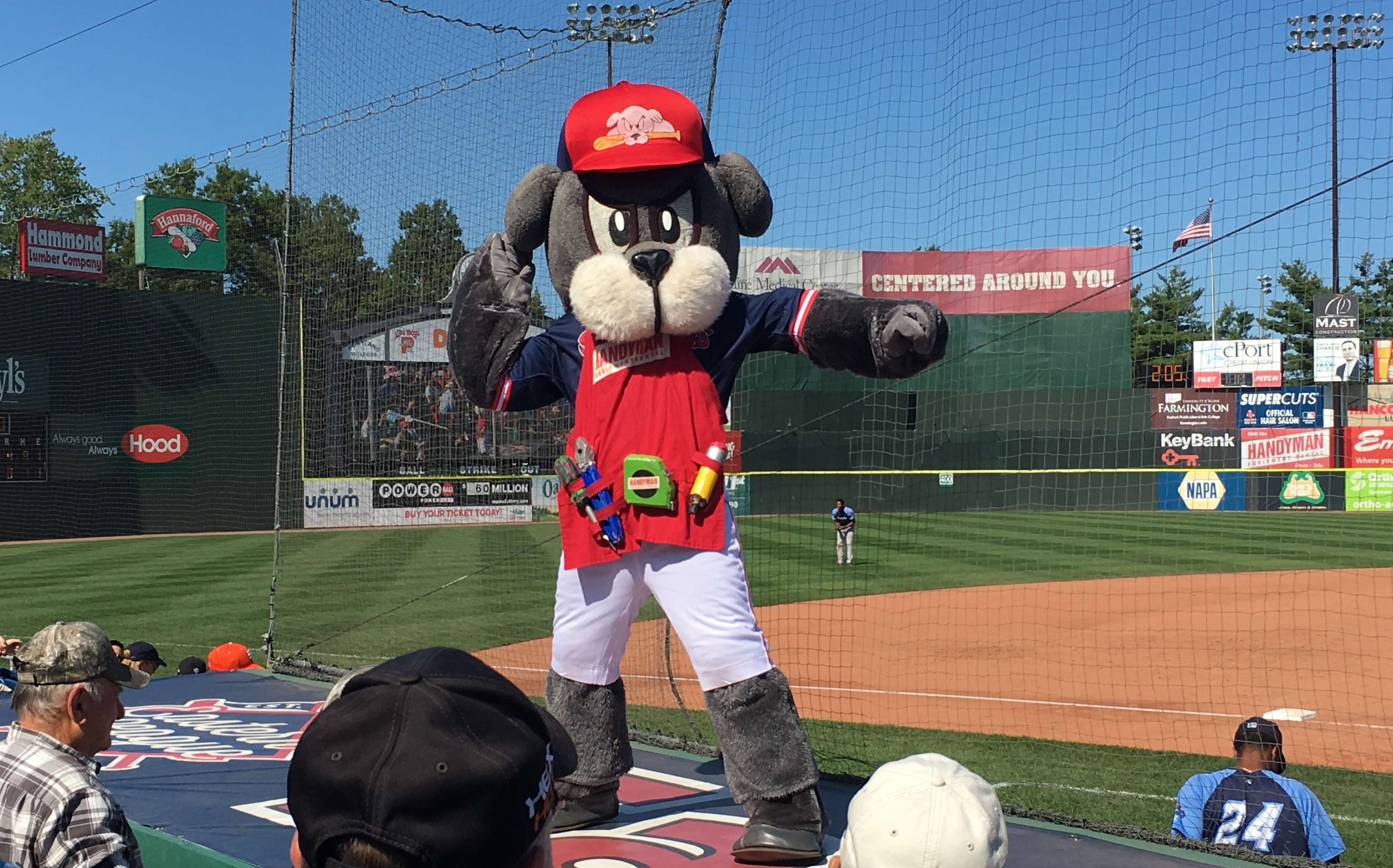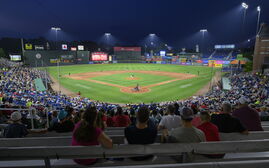
Processing Your Payment
Please do not leave this page until complete. This can take a few moments.
More than a game? Maine's minor-league sports teams may have major impact
 Photo / William Hall
Fans enter Cross Insurance Arena in Portland on Oct. 26 before a Maine Mariners game. The pro hockey team lost that evening, 5-2, to the Newfoundland Growlers.
Photo / William Hall
Fans enter Cross Insurance Arena in Portland on Oct. 26 before a Maine Mariners game. The pro hockey team lost that evening, 5-2, to the Newfoundland Growlers.
As Maine’s only pro basketball team, recently acquired, tips off a new season Saturday — and a deal that would have returned arena football to Portland collapses — the state’s minor-league sports teams may involve more dollars than ever.
The minors play a major role in Maine’s economy, according to some experts. Others are careful not to overstate the impact of the professional sports industry. What’s clear is that Maine “farm teams” are big businesses.
How big? Let’s go to the play-by-play.
Round-ball revival
The Maine Red Claws take on the Delaware Blue Coats Nov. 9 in an away game that will be Maine's first as a subsidiary of the Boston Celtics, the famed National Basketball Association team. The Celtics announced a deal to buy the G League development franchise in July and completed the transaction last month.

Previously, the Claws were an exclusive affiliate of the Celts, but held by a Maine-based ownership group that at one time included Portland City Manager and former Celtics scout Jon Jennings.
With an investment of $2 million, the group launched the Red Claws in the 2009-10 development league season as an affiliate of both the Celtics and the Charlotte Bobcats (now the Charlotte Hornets).
The development league began in 2001 with eight loosely affiliated minor-league teams, but has grown to comprise 28, all exclusive franchises. The league was named the G League in 2017, when Gatorade sports drinks became the title sponsor.
The Red Claws sold out 24 games in their first season, drawing 73,000 fans to the Portland Expo building and attracting over 70 corporate sponsors. But attendance and the team’s performance waned over the years.
However, with the resurgence of the G League, the Red Claws have made a comeback in popularity. The city of Worcester, Mass., has even tried to woo the team from Portland, an overture the Celtics rebuffed.
While the Celtics wouldn’t disclose terms of the Red Claws deal, G League teams appear to command premium prices these days. In 2014, the NBA's New York Knicks paid about $5.5 million for their G League team. By 2017, franchises were selling for $7.5 million to $9 million, according to Sports Business Journal, and values were expected to climb.
Mammoths go extinct
Unlike professional basketball and baseball, pro football doesn’t draw on a minor-league system, and traditionally has recruited from the ranks of top college players.
But there have been several attempts to launch small pro football leagues in small indoor venues, usually with modified playing rules. One of these conferences, the National Arena League, appears to be on an upswing.
The league began in 2016. In 2018, Portland’s Cross Insurance Arena became home turf for an expansion team, the Maine Mammoths.
The team attracted 5,000 fans to its home opener and booked a wide variety of sponsors. "Mammoth Nation" fans were soon standing in line to buy $25 T-shirts and $40 hoodies at each game. But after the Mammoths finished the season the with a 7-8 record, owners Rob Storm and Richard Maslia put the team up for sale. In February, they called off its 2019 season.

Still, it seemed likely that the Mammoths would return under new ownership next year.
In August, Storm said on Facebook that he was “working on” a deal that was “pretty close.” On Sept. 20, the NAL issued a news release saying a sale was in the final stage of approval and that once it was OK’d, “the Mammoths will once again take the field in the NAL for the 2020 season and beyond.”
But earlier this week, Storm told Mainebiz by email, “Sadly, the Mammoths will not be able to take the field for the 2020 season. The group we had in place were financially unable to close. I have spoken to others but none that would be able to be ready for this season.”
Meanwhile, the NAL continues to grow, and in October added two more teams, bringing the total to eight.
Sea Dogs on a streak
For much of their 25-year history, the Portland Sea Dogs baseball team has been on a winning streak — if not always on the field, at least at the turnstiles and concession booth.
The Double-A franchise of the Boston Red Sox ranks among the 25 minor league teams with the highest merchandise sales, Mainebiz reported in July. Based on 2018 sales, the Dogs scored in the top 15% of 160 professional ball teams affiliated with the “bigs,” the Minor League Baseball governing organization said.

The league would not disclose sales volume or rankings for individual teams, but said sales for the affiliates totaled $73.8 million. That’s a 4.2% percent increase over $70.8 million in 2017, and the highest amount since Minor League Baseball began licensing products in 1992.
In October, Portland ranked No. 8 among the "best towns for minor league baseball,” according to a national study. Part of the ranking was based on attendance, and Sea Dogs fans appear to be rabid ones.
Despite the relatively small size of the market and of Portland’s Hadlock Field stadium, the team pulls in an average of 5,677 fans per game. That’s the sixth-highest among 30 Double-A teams and 34th out of all Minor League Baseball teams.
More not-so-minors
The state’s hockey enthusiasts can once again enjoy minor-league play, since the Maine Mariners, an ECHL affiliate of the National Hockey League's New York Rangers, took to the ice at Cross Insurance Arena in Portland last season. The city had been without a pro hockey team for two years after the Portland Pirates were sold and moved to Springfield, Mass.
The Mariners, who take their name from the Portland minor-league team that preceded the Pirates, are owned by Comcast Spectacor, part of telecommunications giant Comcast Corp. (Nasdaq: CMCSA). The Mariners are also the stars of a reality TV series, "Puckland," that aired earlier this year on Comcast subsidiary NBC Sports.
And there’s even a “minor league” — but big-money — pro golf tournament coming to Maine in 2020. The Live + Work in Maine Open, part of the Korn Ferry Tour, will bring 156 of the world's most promising players to the Falmouth Country Club from June 8-14, competing for a $600,000 purse.
The Korn Ferry Tour is the development series of tournaments for the PGA Tour, considered some of the premier men’s competitions in professional golf. Maine is scheduled to host the open for five years, and Korn Ferry estimates each tourney will add $8 million to the regional economy.
Adding up the score
Pro sports affect business and the economy in many ways, from stadium employment to vendor revenue to added spending on local restaurants, bars, hotels and parking.
But the financial impact is difficult to gauge precisely and hinges on many factors, according to Brian Corcoran, founder of Shamrock Sports & Entertainment, the Portland marketing firm that serves as the Korn Ferry tournament’s host organization.
He told Mainebiz the state gets the biggest economic boost from fans who travel for a game or other sports event, and then stick around.
“Economic impact is heavily driven by out-of-market hotel, dining and other merchant/retail sales,” he said in a recent email. “From a high level you want events to be multi-day, to drive frequency and necessity of ‘stay and play’ investments.”
Fans frequently travel across the country to catch their favorite major-league team. How far will they go for a Maine team?
A Sea Dogs report shows 20% of their spectators travel more than 50 miles to attend a game at Hadlock, and the team says there are frequently visitors from other states and other countries in the stands. In contrast, the Mariners draw 90% of their fans from within 25 miles of Portland.
A sports economist told Mainebiz that the money fans spend on minor-league sports may not represent additional revenue for Maine — just a different kind of revenue.
“Largely, minor-league fans are local, and the price of a game competes with things like movies and concerts,” said Joel Maxcy, a professor of sport management at Drexel University and the president of the International Association of Sports Economists.
The crowds at Cross Arena, Hadlock or other pro venues can readily “find something else to do with their money,” said Maxcy, who grew up in Presque Isle and attended the University of Maine.
“Minor-league sports provide an entertainment option, but it’s not much more than that. The actual economic impact is often exaggerated.”
Still, the branding power of Maine’s pro teams may spill over to benefit the business community and the state in general.
“The visibility (of a minor-league team) is a fairly significant value, and some of it translates into other things,” Maxcy said in a phone interview. “But how do you put a number on that?”
Another expert told Mainebiz the allure of the pro teams extends statewide. "There is great value that results for Portland and for Maine," said Sheila Brennan Nee, strategic director at the Maine Sports Commission, an industry organization. "The teams each have an impressive presence reaching well beyond Portland. Players from all three professional teams often do appearances at events, and teams focus their outreach efforts on various nonprofit and youth groups extending into the community.”
At Shamrock, Corcoran believes the Maine sports audience is a lucrative one that will continue to attract business. “We are one of the most respected and admired markets. The continued commitment of our local ownership and management teams to drive value to fansumers …. complements a very promising economic impact.”













0 Comments